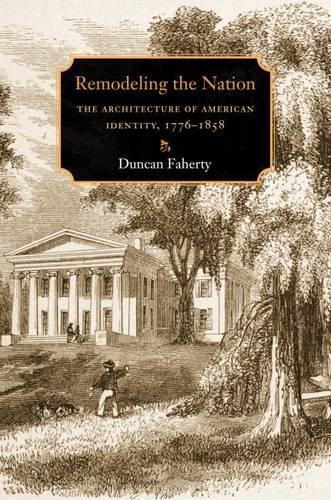Overview
In this interdisciplinary study, Faherty argues that throughout the late eighteenth and early nineteenth centuries, Americans conceptualized their still unsettled political and social states through metaphors of home building. During this period, a pervasive concern with the design and furnishing of houses helped writers to manage previous encounters with settlements, both native and European, and to imagine and remodel a new national ideal. By aligning the period's architectural concerns (registered in both the interior and exterior of houses) with concurrent debates about the need to create a national identity in the wake of the American Revolution, Faherty registers how representations of the house were a crucial locus for debating broadly shared concerns about the anxieties of nation building. Topics include Abraham Lincoln's use of architectural motifs in his 1858 senatorial campaign (the""house divided against itself "" speech); the arguments about domestic identity embodied in the designs of Mount Vernon and Monticello; the lingering import of colonial and indigenous settlements on post-revolutionary culture as registered in the work of William Bartram and Lewis and Clark; Charles Brockden Brown's representations of the multivalent legacies of Pennsylvania's architectural landscapes; Washington Irving's attempts to preserve and remodel national architectural and literary practices by underscoring the manufactured nature of European cultural production; the shifting importance of the house and American attitudes toward nature in the work of three generations of the Cooper family; and the gendering of domestic space in the work of Edgar Allen Poe, Nathaniel Hawthorne, and Herman Melville. Richly informed by contemporary work in literary studies, history, art history, and cultural criticism, Remodeling the Nation ranges incisively across the work of political theorists, social critics, novelists, poets, natural historians, landscape artists, travel writers, and authors of architectural and domestic treatises.
Full Product Details
Author: Duncan Faherty
Publisher: University of New Hampshire Press
Imprint: University of New Hampshire Press
Dimensions:
Width: 15.20cm
, Height: 1.50cm
, Length: 22.90cm
Weight: 0.408kg
ISBN: 9781584657729
ISBN 10: 1584657723
Pages: 268
Publication Date: 03 March 2009
Audience:
General/trade
,
General
Format: Paperback
Publisher's Status: No Longer Our Product
Availability: In Print

This item will be ordered in for you from one of our suppliers. Upon receipt, we will promptly dispatch it out to you. For in store availability, please contact us.
Reviews
[A] rich, well-researched book . . . Here is laudable interdisciplinary work, of equal interest to students of history, literature, or architecture. -- Choice [T]his study calls much needed attention to the ways that post-Revolutionary Americans tried to reconcile the seemingly contradictory ideas of preservation and development, past and future, conservation and progressivism, and local and national. Remodeling the Nation is sure to prompt scholars from many disciplines to reconsider the ways that Americans manipulated space to negotiate identity in nineteenth-century society. -- Virginia Quarterly Review Compelling . . . Faherty offers readers an important story about the naturalization of a national landscape in the midst of spectral occupational histories that continually challenged the fantasy of a coherent national identity. -- American Literature Remarkable. . . . ambitious. -- Journal of Early Republic
. . . compelling . . . Faherty offers readers an important story about the naturalization of a national landscape in the midst of spectral occupational histories that continually challenged the fantasy of a coherent national identity. --American Literature
, . . compelling . . . Faherty offers readers an important story about the naturalization of a national landscape in the midst of spectral occupational histories that continually challenged the fantasy of a coherent national identity. --American Literature
Remarkable . . . ambitious. Journal of Early Republic
The book offers historical geographers interested in meaning embedded in material culture important insight from a cultural criticism perspective. <i><b>Historical Geography</b></i>
. . . compelling . . . Faherty offers readers an important story about the naturalization of a national landscape in the midst of spectral occupational histories that continually challenged the fantasy of a coherent national identity. --American Literature
Author Information
DUNCAN FAHERTY is Assistant Professor, Department of English, Queens College, City University of New York.




